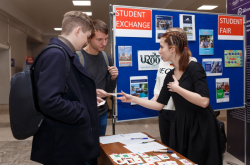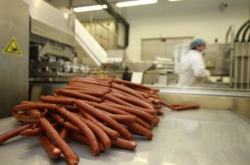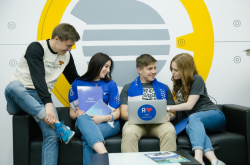Institut Sup'Biotech de Paris
Sup'Biotech is a private engineering school in Paris which was opened in 2003 and is part of the IONIS education group. IONIS is a major network of French educational institutions that unites more than 20 schools and organizations in 14 cities and more than 27,000 students in different program tracks, from marketing and design to power economy and biology.
Sup’Biotech focuses on different fields of biotechnology and training of mid-tier specialists for the bio-industry. According to the school’s representatives, its curriculum aims to maintain the interdisciplinary balance between scientific and engineering courses (lectures, laboratory work and projects), as well as gives students managerial skills and provides for communication with the industry. Representatives of universities, research centers and company experts often lecture at Sup’Biotech.
Among the key program tracks are healthcare, aesthetic medicine, environmental protection, pharmaceutical industry, and agricultural production. The school also has a bioinformatics laboratory.

Applying to Sup'Biotech
Aleksandra Predeina, Alena Moiseenko and Elena Panasuk from the Department of Applied Biotechnology and the Department of Food Biotechnology - Vegetable Stock, spent their last semester at Sup’Biotech Paris. The girls started to prepare for filing the application and submitting the documents in February last year, after they learned about the International Mobility Competition. Initially, they chose from three universities, but it was the French school that had the desired programs in English.
All in all, the preparation took about half a year - first, the students had to pass ITMO’s internal competition. In order to participate, they had to submit a CV, motivational letter, academic transcript, and pass an English language test. Sup Biotech Paris had similar requirements. What is more, the students had to have their study plan approved by their departments.
Studying in France
According to the recent interns, studying at a private school is really different from how it’s done in Russian universities. For instance, they have very few lectures at Sup'Biotech - all lessons involve active interaction between the staff and students. The theoretical foundations are something the students have to study on their own.

“They don’t have lectures where you only listen and make notes; the lectures are based on a dialogue between the lecturer and the students. It is quite interesting; in a sense, it helps to better remember the material. Still, in order to attend lessons like these, you have to already know the theoretical foundations, as well as have the motivation to search for additional materials after the classes and fill in the gaps you might have. This makes you spend more time on self-studying at home,” explain Alena and Elena.
Project work
The courses on almost every subject implied conducting project work. Projects on biomimetics - a track the interns have been following for the first time - were amongst the key ones. Biomimetics focuses on creating devices, mechanisms and technologies inspired by or imitating nature. A good example of them is the velcro fastener that was modeled after bur fruits heads that stick to clothing.
All of them were team projects, so Aleksandra, Alena and Elena got to actively cooperate with both French students and other international interns. The team Aleksandra was part of worked on the “smart suitcase” project. They aimed to develop a sturdy but flexible suitcase that can bend easily without getting damaged. The prototype for their invention were sea cucumbers - mollusks that shrink at a touch, thus becoming sturdier.

The second team sought inspiration in the properties of the pomelo fruit, which has a very thick (up to 4 cm) and sturdy skin. Having taken the plant’s structure for the prototype, they developed a concept of protective gear for cyclists and skaters.
Another major project was part of the SBIP (Sup Biotech Innovation project) program, which focuses on giving a full-scale authentic experience in piloting innovative projects. The students worked in teams of five, in the course of a full semester; as their topic, they had to choose one of the challenges on the Agorize platform.
ITMO students’ team worked on the food crisis issue. According to UN forecasts, by 2050 the planet’s population will amount to nine billion. The global food production will have to go up at least 50% in order to supply it; what’s more, the climate change will supposedly result in an at least 25% decrease in agricultural output. Land resources, biodiversity, oceans, forests and other types of natural capital run out at an unprecedented rate. This is why the transition to a more rational use of natural resources and searching for alternative approaches to agricultural production have to be amongst the key tasks for the foreseeable future.

For the project, the team proposed using high protein lentil as one of the solutions to the impending crisis.
“Our task was to propose a product that does not contain animal protein and is based on vegetable stock only. What’s more, not only did we have to come up with the idea of this product and prove its nutritive properties, but cook it, as well - this was the most challenging part. The result was to be a dish you’d really want to eat. So, we developed a dessert from high protein lentil for our project. For now, we’ve passed onto the second stage of the contest,” share the project’s participants.
The contest’s finals are planned for March; if the project makes it to the list of finalists, the students will go to France once again to present their project as a three-hour presentation that will include the actual cooking of the product.
Living in France
During the internship in france, one can live in a dorm provided by the university. In order to make use of this option, you have to provide additional documents (the full list is available at the receiving side’s coordinator). The cost is 615 EUR per month, but this money can be reimbursed via the CAF (Caisse d’allocations familiales) foundation. An alternative option is to rent a house or a flat. The cost of living in France is quite high, so it is better to cook your own meals.

On the whole, the recent interns note that if an international student has any questions, those can be always clarified with the help of the coordinator.
“One of the best things about this French internship was that we never felt abandoned. All questions were considered, we were always asked if everything was ok. There were ten international students in our class, others were French. And in case we ever misunderstood anything during laboratory work, they were always there to help us,” comment Alena and Elena.
Future prospects
During the internship at Sup Biotech, the girls got to study new subjects that they never learned in Russia. Apart from the core subjects, the curriculum included lessons on aesthetic medicine, biomimetics, synthetic biology and bioinformatics. This has been a great experience, as well as gave the understanding of what they want to work with in the field of biotechnology. Also, studying these new subjects gave them ECTS credits that can be used when applying to a Master’s program abroad.
“I really liked one of the new topics we learned about in Paris. It has to do with development of new biosensors. In essence, these are modified bacteria that react to particular substances by changing color. The technology is quite promising, and can be used in food industry, as well. For one, you can add such biosensors in yogurt. By eating such products, people will be able to learn about their potential diseases by looking at the color of their excretions, and consult a doctor if necessary. I plan to continue on with this topic if the equipment I work with will be enough,” says Aleksandra.

In future, Aleksandra and Alena plan to continue with academic mobility programs; they are now considering Brazilian, Argentinian and Mexican universities that focus on food technology. Elena plans to focus on projects that have to do with quality control in food manufacturing.





